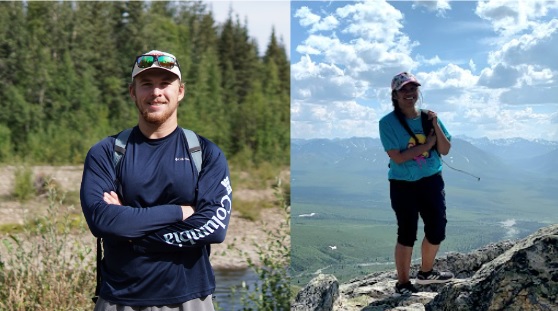What’s Better Than One Intern Working on a Research Project? Two, of Course!

This summer, ACEP researcher Phylicia Cicilio is mentoring two interns who are assisting her with research on the Railbelt decarbonization project. This work is important for the goal of reaching 100% carbon-free energy in Alaska through renewable technologies with inexpensive electricity.
Alexis Francisco will be in her senior year at the University of Alaska Fairbanks, where she studies electrical engineering with a concentration in power and control. Leif Bredeson is going into his junior year at South Dakota State University, where he is studying electrical engineering. Each is contributing to the Railbelt decarbonizationproject by completing deep dives into one or two technologies of interest and modeling their behaviors and effects.
Francisco’s work in the decarbonization project is currently focused on solar PV energy, and she will later also work on wind energy. Although solar and wind energy are variable, they can provide affordable and carbon-free electricity, hence the increasing popularity of installing solar panels in homes as well as large utility-scale solar and wind generation sites.
Francisco is learning modeling techniques for these resources that can be applied not just along the Alaska Railbelt but also in Alaska’s remote villages and other countries. Her goals during the internship include applying and expanding her knowledge in power systems, renewable energy integration and energy standards. She also hopes to gain proficiency in Python coding and in the power system modeling programs PSSe and PowerFactory.
After graduation in spring 2023, she plans to work out of state in the power engineering field, preferably with renewable energy. Aside from school and work, Francisco enjoys taking walks, hiking, kayaking, painting and watching Korean dramas and anime.
Bredeson’s work has been focused on modeling hydroelectric and pumped storage hydro resources in PSSe. This work is important because of Alaska’s interest in increasing its hydroelectric generation capacity. The Railbelt has no pumped-storage hydro generation; however, this technology will be studied in the project scenarios. Additionally, the team will explore new PSH modeling methods that have not been popularized in PSSe models.
Bredeson finds it particularly interesting to learn about innovative technologies in the renewable energy field.
“It makes my work even more exciting, knowing that these technologies I am researching have the potential to make a lasting impact on Alaska and the push for renewable energy,” he said.
Bredeson’s top priorities at ACEP include gaining experience in the engineering research field, as well as absorbing applicable knowledge of power systems analysis and innovative renewable energy technologies. He also hopes to forge a strong foundation in PSSe, PowerFactory and Python. He is also excited to expand his professional network to a new region with new opportunities and experiences.
Originating from southwest Wisconsin, Bredeson is excited to enter his third year of engineering at South Dakota State University in Brookings, South Dakota. He hopes to find an emphasis for his education this coming year and apply that knowledge in his career to make a positive impact. Apart from education and engineering, Leif enjoys being outdoors, hiking, playing disc golf and powerlifting.
South Dakota State University also collaborates with UAF ACEP’s Converter Dominated Power Systems Team on a synergistic project, “Development and validation of models to assess dynamic response of converter-dominated power systems across multiple spatiotemporal scales.” The project is supported by the U.S. Department of Energy, Office of Science, Office of Basic Energy Sciences, Office of Electricity, and Office of Energy Efficiency and Renewable Energy under award number DE-SC00020281.
Francisco and Bredeson’s project is part of the ACEP Undergraduate Student Internship program and is funded by the Office of Naval Research. For more information on the internship program, please contact Jeff Fisher at jsfisher3@alaska.edu.
(Left) Alexis Francisco stands on top of Savage Alpine Trail in Denali National Park. (Right) Leif Bredeson enjoys a kayak ride at Tanana Lakes. Both are ACEP interns this summer.


